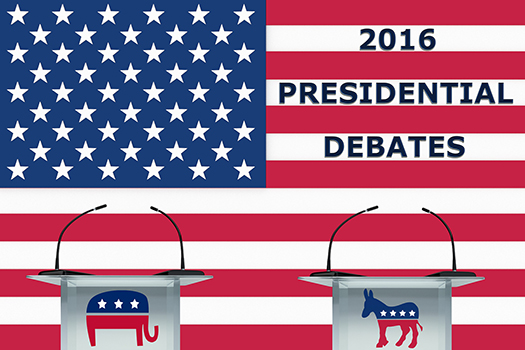If I Could Ask the Candidates: A Presidential Debate About Blindness and Visual Impairment
September 25, 2016
The upcoming presidential debates have me thinking about what I might ask the candidates if I were a debate moderator. It isn’t often that disability issues get front-and-center attention during a nationally televised event like a presidential debate, let alone issues specific to people who are blind or visually impaired.
But what if they did?
Would I use my opportunity to ask the candidates about their position on the payment of subminimum wages to people with disabilities? Would I ask them about the need to ensure that people with disabilities have an unequivocal and supported right to full integration into society? Or would I use my question time to urge them to promote the prompt ratification of the UN Convention on the Rights of Persons with Disabilities?
Maybe. While these hot topics in the disability community are getting a fair amount of attention, any number of critical issues are not. And so here are my top choices for the questions I would ask the candidates during the debates if I had the chance:
The Obama Administration promised the disability community that it would issue much clearer rules about how the Americans with Disabilities Act (ADA) applies to retailers and other businesses that operate exclusively online. The Obama Administration has not kept this promise. As president, would you commit to the issuance of federal regulations within the first six months of your presidency that would make it clear that online-only places of public accommodation cannot discriminate against people with disabilities?
Technology can be a tremendous liberator for people with disabilities, but it can also be a barrier to our full integration into society. What steps would your administration take to ensure that people with disabilities are able to make full use of technologies in the health care, consumer electronics, and employment contexts?
After more than 40 years, we still haven't done enough to ensure children with disabilities get an equal education. This challenge is particularly acute for children with sensory disabilities, such as vision or hearing loss, deafblindness, and who may have additional disabilities. Will you join the more than 100 major national, regional, and community-based organizations across America who are calling for the prompt enactment of the Cogswell-Macy Act, which would improve the quality of instruction, services, and resources for students who are visually impaired, deaf, or deafblind? What steps would your administration take to ensure that the U.S. Department of Education does right by children who are blind, visually impaired, deaf, hard of hearing, deafblind, or who may have additional disabilities?
As America ages, we know that the number of people experiencing age-related vision loss is expected to increase dramatically. However, state and federal governments are not investing in the kinds of services that would keep older people with vision loss from institutionalization simply because they are not provided with the support needed to live independently. Are you willing to commit, as part of the first budget you submit to Congress, to doubling funds for the Older Individuals Who Are Blind program, the only national program dedicated to meeting this need? And how might you make improvements to the program to reduce bureaucratic barriers that keep people from receiving services?
We spend so much money in this country on prevention of vision loss, and the American Foundation for the Blind has always been supportive of efforts to increase vision screenings. However, our nation’s fear of blindness has meant that we've focused on prevention to the detriment of assisting those who do live with vision loss to learn, work, and live independently. We need to send the message that vision loss does not have to mean the end of independence, productivity, or full participation in community life. What will you do as president to ensure funding for programs that assist those with vision loss is at least comparable to those dedicated to vision loss prevention and screening?
Surely, with three debates scheduled, and given how vision loss likely affects the lives of every family in America, debate moderators can ask at least one of these important questions. These questions, and the candidates' responses, could initiate a national debate, ultimately leading to positive changes in the lives of individuals who are blind or have vision loss.
What questions would you ask if you were a debate moderator?
